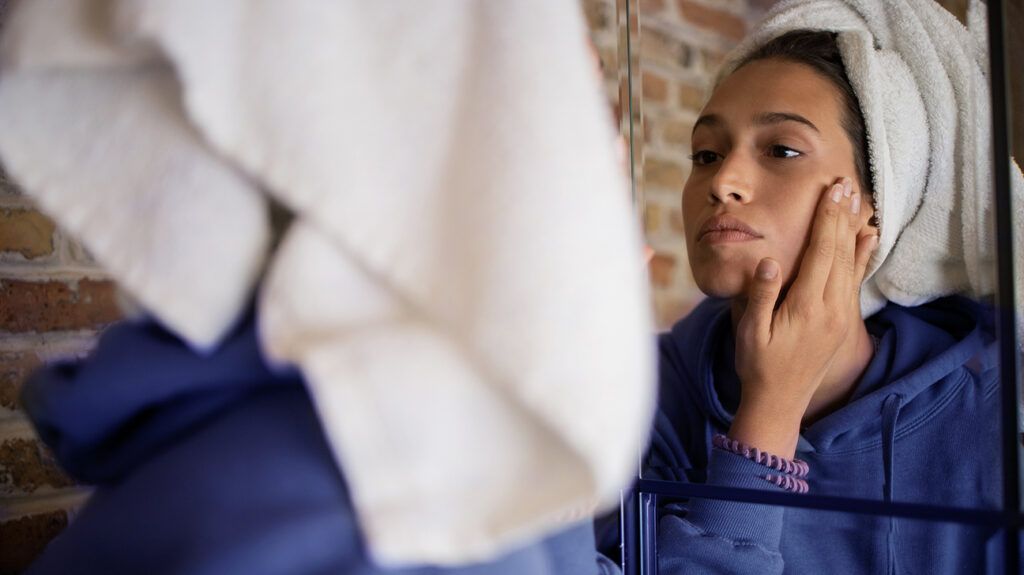Topical rosacea medication can help calm inflammation and reduce symptoms such as redness and pimples. Healthcare professionals may prescribe oral medications for more severe cases.
Rosacea is a common skin condition that can cause symptoms affecting the face and eyes. Healthcare professionals may advise someone with rosacea to identify and avoid triggers.
They may also recommend certain moisturizers and cleansers. In addition, healthcare professionals typically advise treating rosacea with topical and oral medications.
This article discusses some common medications for rosacea.

Experts explain that azelaic acid helps prevent pores from becoming blocked and reduces the associated inflammation. They note that studies suggest this medication relieves symptoms in
The National Rosacea Society (NRS) advises that healthcare professionals may prescribe a 15% formulation of azelaic acid as a gel or foam. People can apply this twice daily to their skin to treat bumps and pimples in mild to moderate rosacea.
According to the NRS, encapsulated benzoyl peroxide is available as a 5% prescription medication for skin affected by mild to moderate rosacea. The medication treats the symptoms of inflammatory bumps and pimples when applied twice daily.
Within the cream, microcapsules contain the benzoyl peroxide and release it gradually over time, according to the drug’s manufacturer. This encapsulation allows the medication to penetrate the layers of the skin without drying it out, so it may be more suitable for some people than benzoyl peroxide acne medications that can cause irritation.
The NRS advises that oxymetazoline is available by prescription as a 1% cream formulation to apply once per day or as a doctor directs.
According to a
However, the review notes a relatively high rate of adverse reactions, although these are generally mild. They include worsening erythema and irritation, which usually resolve shortly after application or as the medication wears off.
According to
Individuals may use the cream for up to 4 months or as a doctor recommends. Experts also note that ivermectin causes a clear improvement in symptoms in 31 out of 100 people.
If topical treatments are unsuccessful or rosacea symptoms are severe, healthcare professionals may prescribe oral medications such as doxycycline. The medication may address signs of inflammation in areas such as the nose and eyes, which can cause thickened skin or blocked sebaceous glands.
Doxycycline is a medication that reduces inflammation and combats bacteria. Doctors usually prescribe a lower dose for rosacea than they would for bacterial infections alone.
Because doxycycline travels around the body in the bloodstream, it can have more side effects than topical medications for rosacea. Around
The NRS notes that minocycline is available by prescription as a 1.5% foam formulation. People apply it once per day to treat the bumps and pimples of rosacea.
They must wear a sunblock and avoid getting the medication in their eyes or mucus membranes.
The NRS advises that sulfacetamide sodium/sulfur is a topical medication doctors prescribe for rosacea and other skin conditions such as acne.
Different forms of the medication exist, including cleaners and creams. The most common dosage is 10% sulfacetamide sodium and 5% sulfur, the NRS notes. People apply the medication as their doctor directs up to 3 times daily.
Beta-blockers are not FDA-approved medications for the treatment of rosacea. However, they may improve severe symptoms of redness or discoloration and flushing.
According to a 2020 review, oral beta-blockers may be an effective treatment for rosacea and facial flushing that does not respond to typical medications, as long as a person can manage the side effects of a lower heart rate and blood pressure. However, more research is needed to confirm beta-blockers as an effective and safe treatment for rosacea.
The following are answers to some questions people frequently ask about rosacea and medications to treat it.
How do you calm a rosacea flare-up?
The American Academy of Dermatology (AAD) advises that several triggers may lead to rosacea flare-ups, and it may help to avoid drinking alcohol, eating spicy foods, and overheating. If a flare-up occurs, speak with a healthcare professional for medication or other skin care options to help ease the symptoms.
Which medication is most effective in treating rosacea?
The NRS notes that healthcare professionals should tailor treatment to each individual. What works for one person may not be appropriate for another.
Healthcare professionals may recommend a combination of medications and treatment options, including both topical and oral ones. If these treatments are not effective, an individual can speak with their healthcare professional about alternatives, such as laser treatment, light therapy, or surgery.
A number of medications may be effective for managing the symptoms of rosacea. Topical or oral medications may reduce inflammation and flushing and help to reduce bumps and pimples.
A healthcare professional can advise a person about the most effective medication for them. In addition, they may recommend lifestyle changes, such as avoiding overheating or consuming food and drinks that may trigger symptoms. People may also find that using specific cleaners or moisturizers may help.
